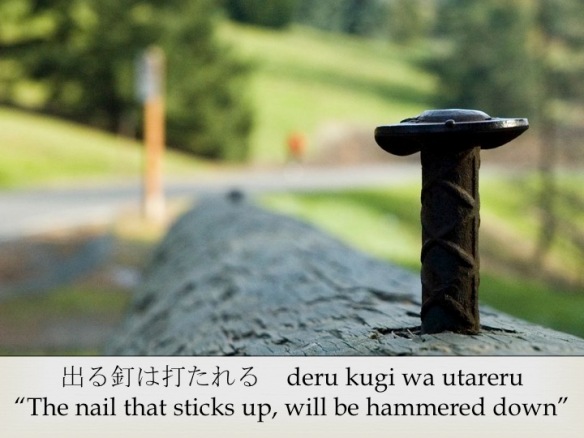 There is a saying in Japan: 出る釘は打たれる deru kugi wa utareru – it is generally translated as “The nail that sticks up, will be hammered down.” If you are a carpenter building a house, this makes sense – nails that stick out are dangerous, causing injury or damage to various things that can get snagged. We expect a carpenter to pound in that protruding nail. But this saying is referring to people. It means that people who stand out – because of their behavior, their looks, their academic performance (not only falling behind, but even being too far ahead) – need to be made to conform.
There is a saying in Japan: 出る釘は打たれる deru kugi wa utareru – it is generally translated as “The nail that sticks up, will be hammered down.” If you are a carpenter building a house, this makes sense – nails that stick out are dangerous, causing injury or damage to various things that can get snagged. We expect a carpenter to pound in that protruding nail. But this saying is referring to people. It means that people who stand out – because of their behavior, their looks, their academic performance (not only falling behind, but even being too far ahead) – need to be made to conform.
One of the most extreme examples I have heard of recently has to do with hair. Many schools have a rule that students are forbidden to dye their hair. Now, in the history of strict school rules, this doesn’t seem that bad. It may prevent some kids from expressing themselves as they would like, but it is not unheard of. Many schools, in America as well, find extreme hair cuts and dye jobs to be a distraction to their mission of education.
But here is where it gets strange. Japanese people generally have black hair. So how is the “no hair-dyeing” rule applied to people that don’t fit the norm – foreigners, children of multi-racial parents, or the rare Japanese person with lighter brown hair? Those students are required to dye their hair black.
In order to enforce a “no hair-dyeing” rule, some children are forced to dye their hair.
There is currently a court case in Osaka Prefecture brought by a Japanese high school student over the mental anguish she has suffered from being forced to dye her naturally brown hair black (Link to BBC Article). She claims that teachers told her, “If you don’t dye your hair black, then don’t bother coming to school.” She says her situation has caused her to be ridiculed by other students and the frequent dyeing has caused damage to her hair and the development of a rash on her scalp.
Some schools avoid this requirement by maintaining a “light-colored-hair registry” (Link to Asahi Shimbun article). Students who have non-black hair are given a form to fill out attesting to its natural color. Parents must provide their seal on this form, and are sometimes required to provide pictures of their child as an infant for proof. Students with curly hair are also required to submit proof that it is naturally occurring.
One would think that parents would give a lot of pushback against these rules, but schools actually consider them to be a benefit. With the shrinking population, competition for students at the various private and public schools has grown. Strict discipline is an important selling point.
We often tell people that the best thing that helped our family’s transition to Japan was CCSI – Covenant Community School International. CCSI is a dual-track (Japanese and English) Christian school that was started by our team initially to provide schooling for missionary children. Over the years it has grown to around 60 kids, not only from missionary families, but Japanese and international children as well. We are truly thankful to be able to send our kids to a school that is focused on the worship of Christ, not on an idol of conformity.
As missionaries, we take the “long view.” Japan has been some of the rockiest soil for the spread of the Gospel. But I truly believe that the work we do with our school – helping to raise up a generation of Christ-centered kids in Japan (most of whom are fluently bilingual) will bear great fruit in the decades to come.
